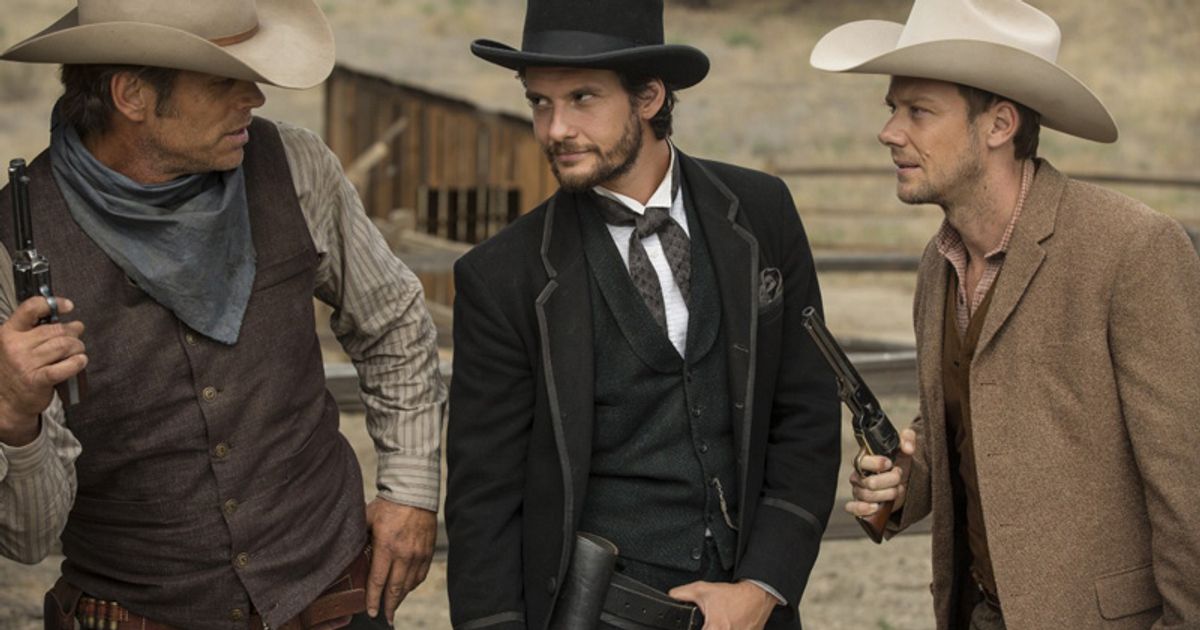Dissonance Theory – The Man in Black’s quest for The Maze sees him cross paths with a few outlaws. Dolores continues to break her routine as she stays with Logan and William. Meave has flashing reconciliations of mysterious figures while Director Ford’s narrative work takes on a much bigger scale.
This is an episode full of tantalizing hints but there is one that trumps them all. After vague implications of a suspicious past concerning his former partner Arnold, this week a firm line is drawn in the sand. It seems that Anthony Hopkins and Director Ford are transitioning towards being villains and considering that Mr. H has already given us one of the most iconic villains in cinematic history so this should not be underestimated. The whole reveal scene with Theresa is utterly superb as Ford sits there with an Agent Smith level of power and composure before ever so politely threatening her, “Please, don’t get in my way. It’s almost like there is an entirely new level of power of authority within the park. That Ford is a guest and all the other staff and workers are merely his hosts: they may think they have free will but everything conforms to his overall design. Think back to Ford’s remarks last week about hosts being merely objects. This week very subtly applies the same perspective to Theresa by commenting that there have many people previously in her job and that he’s, “Not the sentimental type”. It’s like he’s putting a gun to her head and a match to her contract at the same time.
By role-reversing contrast, we even get a blink and you’ll miss it implication that Ed Harris’ Man In Black (I really wish they’d give him a name!) is actually a good guy, or at least a good person outside the Park. He gets celebrity spotted by a fellow guest that refers to “your foundation” in the context of a charitable institution. Now that doesn’t imply that his in-game agenda is benevolent. This could easily be his equivalent of The Purge: he vacates to the Park for a few weeks each year, fulfils all his darkest desires before going back to being a man of charity. It does however, debunk some fan theories that he’s always been in the Park by confirming he has a life in the real world. His story gets far more interesting this week by the way it has now linked into the Wyatt story, a.k.a Ford’s narrative. He even seems to know of Arnold, presumably from the early days of the Park, “You could say that he was the original settler”. This all adds weight to connections between The Maze, Ford’s narrative and some kind of end game for the Park. The Man in Black even mentions it himself, “This whole world is a story and I’ve read every page except the last one”. Could Ford be working on some sort of ending? Ford talked about legacy, and legacy normally implies going out while you’re on top. It still feels like there’s more to it though, especially as Dolores is brought into the idea of The Maze by Bernard as almost a means to becoming sentient. There are definitely a few things overlapping there.
Speaking of Dolores, her story arc with William takes a more solid form. It looks like it will be a season long Turing test/Ex Machina-style situation. William came in as the skeptic, and despite developing some surface affections to Dolores, he still makes multiple allusions to her artificial state to make it clear that he still views her as a machine. As statement towards the value of artificial life, we’ll slowly see William falling in love with her as a person, artificial or not, to symbolize the lack of differences between guests and hosts.
I wasn’t sure how to feel about Meave’s story early in the episode but I really like the way it developed and explored the ideas of hosts expressing the inconsistencies of their existence or hints of their truth through notions of superstition or even religion. Just as we see the more advanced Delores able to describe and articulate these feelings, we see Meave and others steps behind expressing them in different ways. It delivers some good shocking moments too. Meave’s discovery in the floor boards was like the show’s take on The Silence tally marks in Doctor Who for a penny drop over repeated events. Then her later exchange with outlaw extraordinaire Hector takes on a more religious approach as he refers to Park’s suited technicians like grim reapers, “They were sent from hell to oversee our world”. That is such a brilliant line. It conjures images of the flawed real world (“hell”) and the Park being created as a Heaven like paradise, which in so many ways, it is for its guests. Then finally the pair’s closing moments of abandonment upon seemingly becoming self-aware reflect on sin as discovering that their lives have no meaning negates all obligations of morality or consequence. It’s all steadily building towards a mass revolution-like event as such ideas keep resurfacing through each narrative cycle that promises to be spectacular.
The storytelling pace of the entire season so far has been neigh on perfect. Although the first two episodes were slower lead-ins, now things are really progressing and at nearly the halfway point, it feels like we’ve made meaningful ground. While not all directions are clear (such as the “not Orion’s Belt” symbol carvings), the season continues to progress well with another fantastic episode. To top it all off, we even get a Walking Dead Easter Egg as last week’s suicidal hosts sits in the lab looking like he’s just had a dirty dance with Lucile.








